Fanstel Taipei BT832 Bluetooth 4.2 Module User Manual
Fanstel Corporation, Taipei Bluetooth 4.2 Module Users Manual
Users Manual
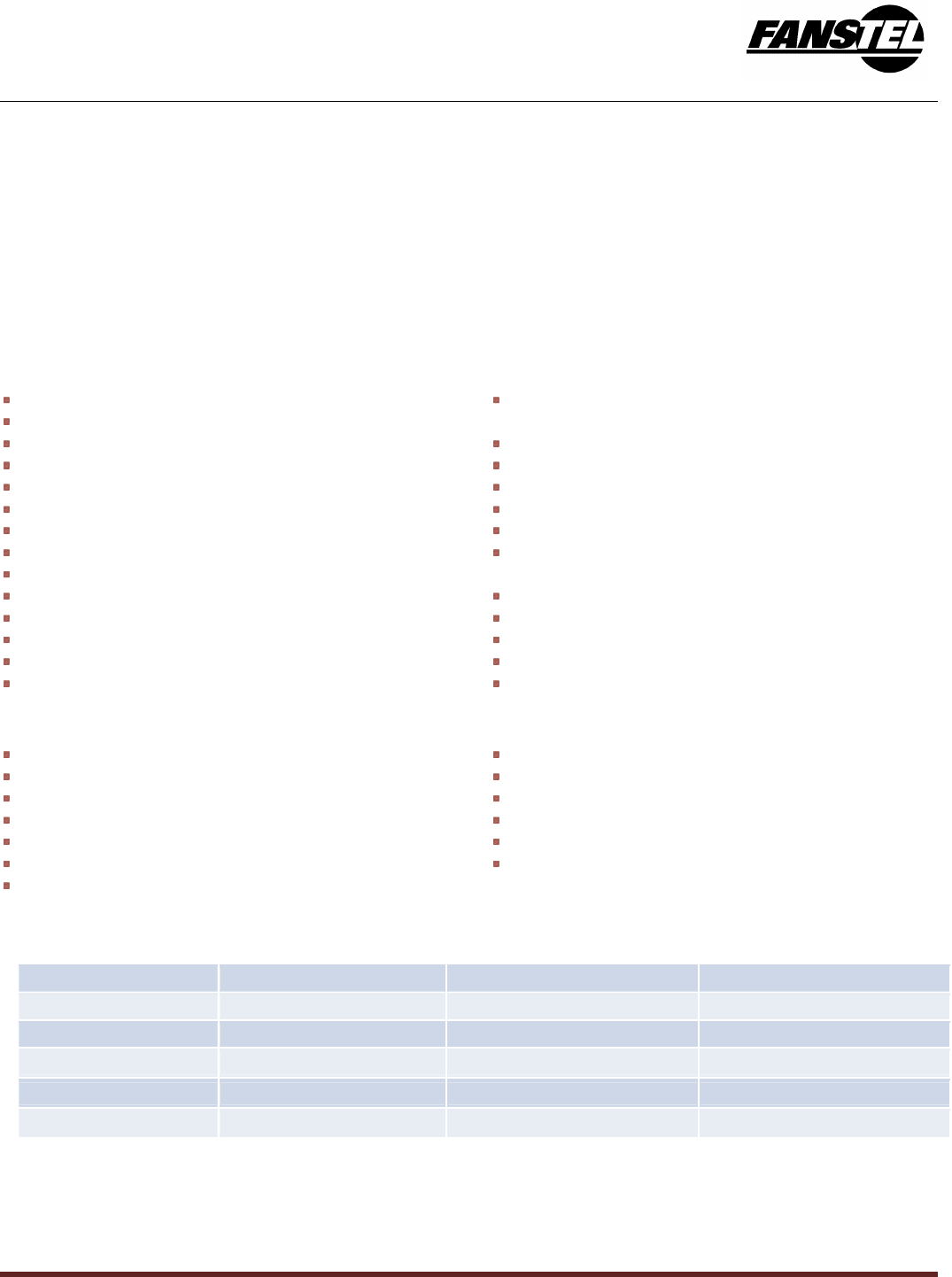
Bluetooth Low Energy(BLE) 4.2 Module BT832/BT832FVer 1.0 Nov. 2016
1
BluNor BT832 is a powerful, highly flexible, ultra low power Bluetooth Low Energy (BLE) using Nordic
nRF52832 SoC. With an ARMCortexTM M4F MCU, available 512KB flash, 64KB RAM, embedded 2.4GHz
multi-protocol transceiver, and an integrated PCB trace antenna. It allows faster time to market with reduced
development cost.
For applications needing limited number of IO pins, prototyping and production are easier using 16 castellated
pins. Additional 24 LGA (Land Grid Array) pins provide full access to 32 GPIOs of nRF52832.
BT832F is developed for ultra long Bluetooth range. It is measured at over 100 meters with a smartphone.
Specifications:
Nordic nRF52832 with ARM Cortex M4F.
Complete RF solution with integrated antenna
Integrated DC-DC converter
Serial Wire Debug (SWD)
Nordic SoftDevice Ready
Over-the-Air (OTA) firmware update
Flash/RAM: 512KB/64KB or 256KB/32KB.
32 General purpose I/O pins
12 bit/200KSPS ADC
3 SPI Master/Slave (8Mbps)
Low power comparator
Two 2-wire Master/Slave (I2C compatible)
I2S audio interface
UART (with CTS/RTS and DMA)
20 channel CPU independent Programmable
Peripheral Interconnect (PPI).
Quadrature Demodulator (QDEC)
128-bit AES HW encryption
5 x 32 bits, 3 x 24 bits Real Time Counters (RTC)
NFC-A tag interface for OOB pairing
Receiver Sensitivity: -96 dBm
TX power: +/- 0 dBm; programmable +3dBm to -
20dBm in 4 dB steps.
Sizes: 14.0x16.0x2.5mm
Hybrid pins: 16 castellated and 24 LGA.
Integrated high performance PCB trace antenna:
Operation voltage: 1.7V to 3.6V
Operation temperature: -40°C to +85°C
Applications
IoT (Internet of Things)
Wearable
Beacons/Proximity
Fitness/Sports
Smart toys
Connected appliances
Lighting products
Sensors
Home and building automation
Key fobs
Wrist watches
Wireless charger
Interactive entertainment devices
Model Summaries
module BT832 BT832-23 BT832F
SoC nRF52832-QFAA nRF52832-QFAB nRF52832-QFAA
Flash/RAM 512KB/64KB 256KB/32KB 512KB/64KB
BT Antenna PCB trace PCB trace PCB trace
FCC ID Pending Pending Pending
Canada IC ID Pending Pending Pending
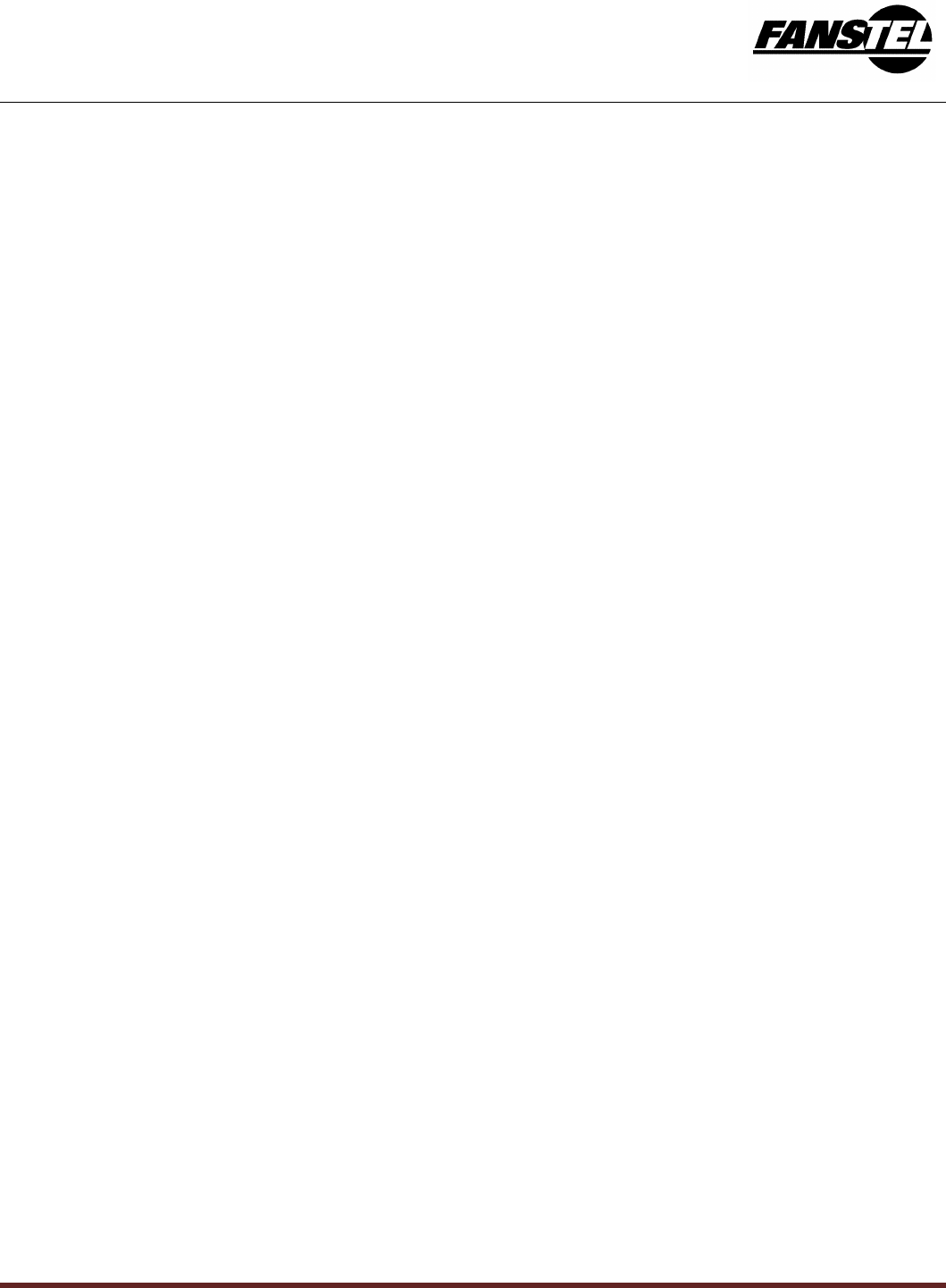
Bluetooth Low Energy(BLE) 4.2 Module BT832/BT832FVer 1.0 Nov. 2016
2
Table Of Contents
1.
1. Introduction ............................................................................................................................................... 4
2. Codes Development Using Nordic Tools .................................................................................................. 4
Easy, fast and safe code development ........................................................................................................... 4
Over-The-Air DFU .......................................................................................................................................... 5
SoftDevices.................................................................................................................................................... 5
Development Tools ........................................................................................................................................ 5
3. Product Overview ..................................................................................................................................... 6
Block Diagram ............................................................................................................................................... 6
Photo ............................................................................................................................................................. 8
Mechanical Drawings ..................................................................................................................................... 9
Pin Assignments of BT832 ........................................................................................................................... 10
Pin Functions ............................................................................................................................................... 11
Mounting BT832 on the Host PCB ............................................................................................................... 11
Mounting BT832F on the Host PCB ............................................................................................................. 13
4. AT Commands ........................................................................................................................................ 14
Brief description of AT commands ............................................................................................................... 14
Command mode .......................................................................................................................................... 14
Data Mode ................................................................................................................................................... 16
5. BT832 Evaluation Board ......................................................................................................................... 16
Communicating with a PC ............................................................................................................................ 16
Evaluation Board Schematics ........................................................................................ 錯誤! 尚未定義書籤。
Suggestion for Battery Power Application .................................................................................................... 17
6. Miscellaneous ......................................................................................................................................... 18
7. Contact Us .............................................................................................................................................. 18
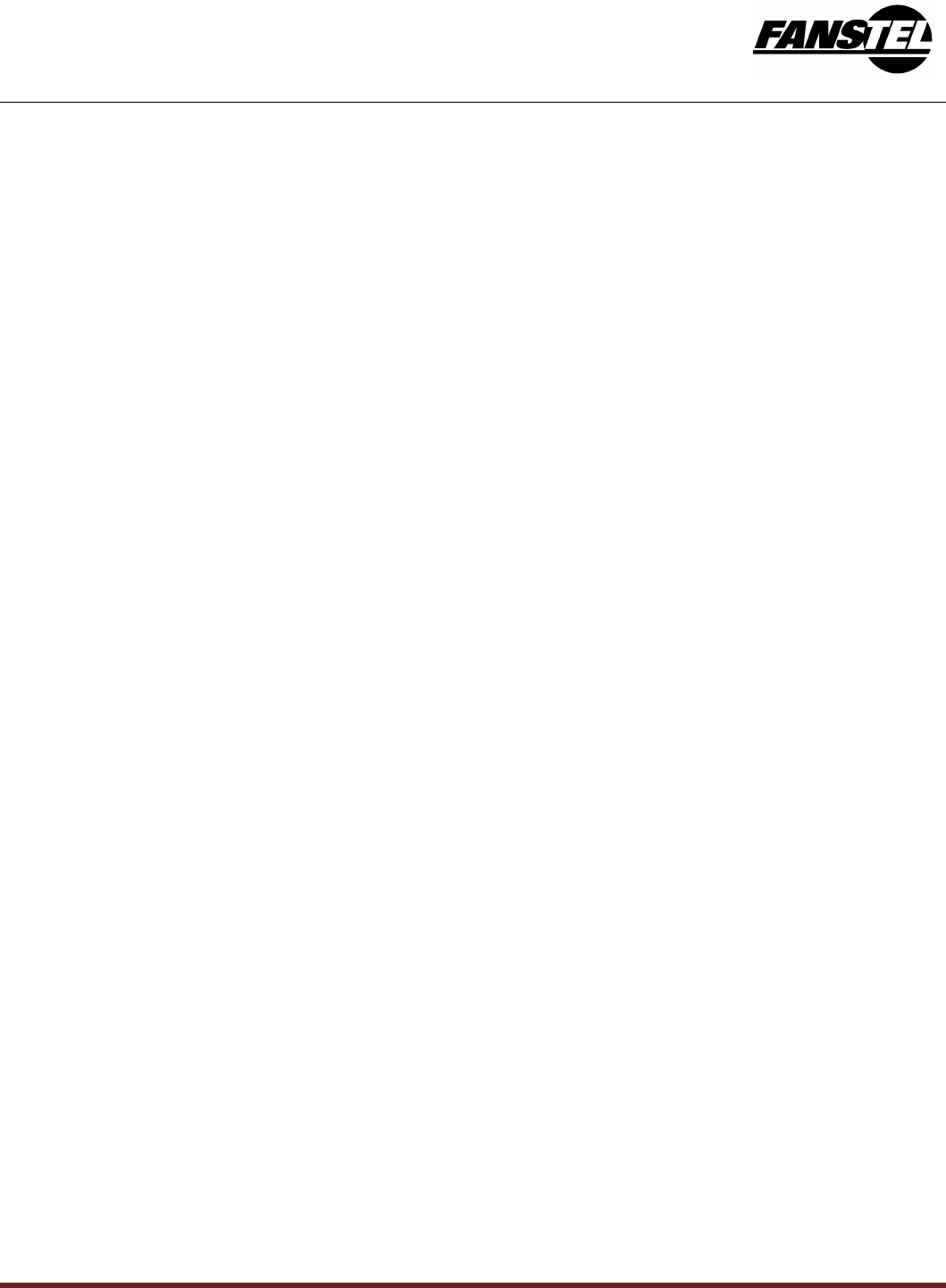
Bluetooth Low Energy(BLE) 4.2 Module BT832/BT832FVer 1.0 Nov. 2016
3
1.
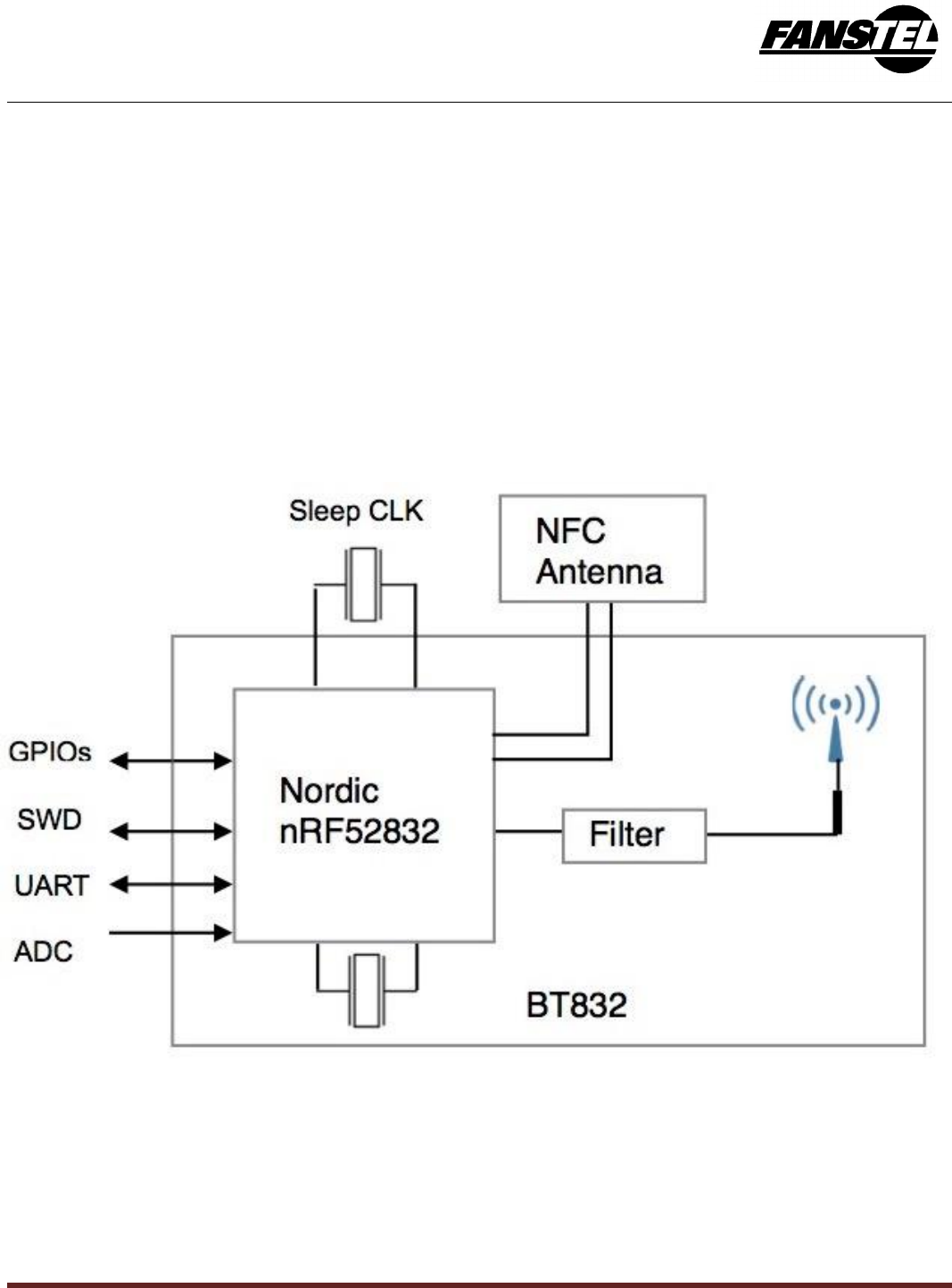
Bluetooth Low Energy(BLE) 4.2 Module BT832/BT832F
Ver 1.0 Nov. 2016
4
2. Introduction
BluNor BT832 is powerful, highly flexible, ultra low power Bluetooth Low Energy (BLE) modules using Nordic
nRF52832 SoCs. With an ARMCortex
TM
M4F MCU, available 512KB flash, 64KB RAM, embedded 2.4GHz
multi-protocol transceiver, and an integrated antenna, it allows faster time to market with reduced development
cost.
The following is a block diagram of BT832. Antenna circuit and main clock are integrated. All 32 GPIOs of
nRF52832 can be accessed from main board. For lower power consumption at idle state, a 32.768 kHz crystal
is added on the main board. Connection to an external NFC (Near Field Communication) antenna is provided.
BlurNor BT832F is a sister module of BT832. The foot print for for the main body of module is identical. The
only difference is a larger area for PCB trace antenna for ultra long Bluetooth operation range. Bluetooth line of
sight range with a smartphone is measured at more than 100 meters.
3. Codes Development Using Nordic Tools
Development tools by Nordic and other third party development tools recommended by Nordic should be
used .
Easy, fast and safe code development
Nordic development environment for nRF52832 offers a clean separation between application code
development and embedded protocol stacks. This means compile, link and run time dependencies with the
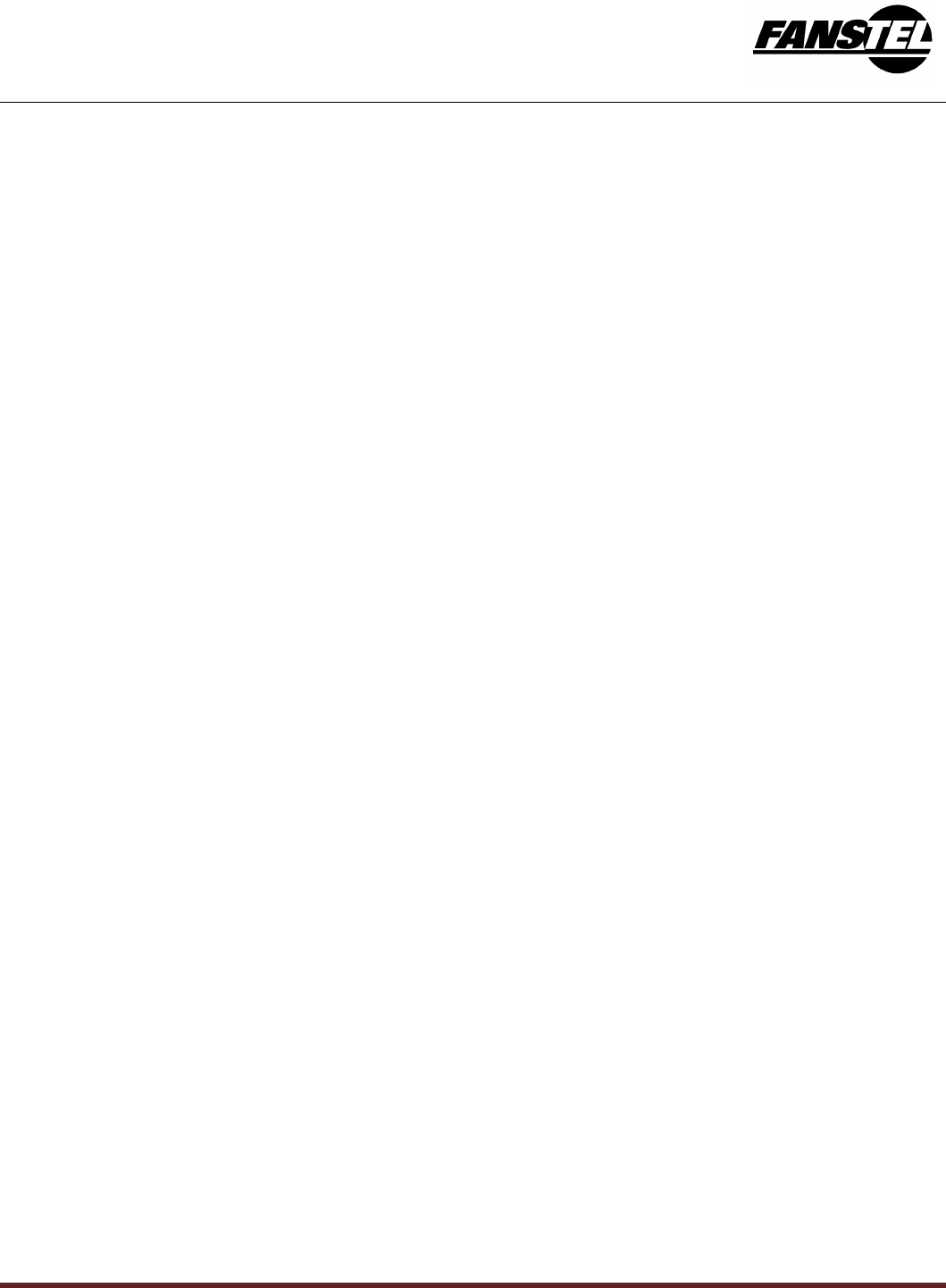
Bluetooth Low Energy(BLE) 4.2 Module BT832/BT832FVer 1.0 Nov. 2016
5
embedded stack and associated debugging challenges are removed. The Bluetooth low energy is a pre-
compiled binary, leaving application code to be compiled stand-alone. The embedded stack interface uses an
asynchronous and event driven model removing the need for RTOS frameworks.
Over-The-Air DFU
The nRF52832 is supported by an Over-The-Air Device Firmware Upgrade (OTA DFU) feature. This allows for
in the field updates of application software and SoftDevice.
SoftDevices
The Nordic protocol stacks are known as SoftDevices and complement the nRF52 Series SoCs. All nRF52 Series are
programmable with software stacks from Nordic. This bring maximum flexibility to application development and allows
the latest stack version to be programmed into the SoC.
SoftDevices available from Nordic:
S132: Bluetooth low energy concurrent central/peripheral/observer/broadcaster stack.
Development Tools
Nordic Semiconductor provides a complete range of hardware and software development tools for the nRF52 Series
devices. nRF52 DK board is recommended for firmware development.
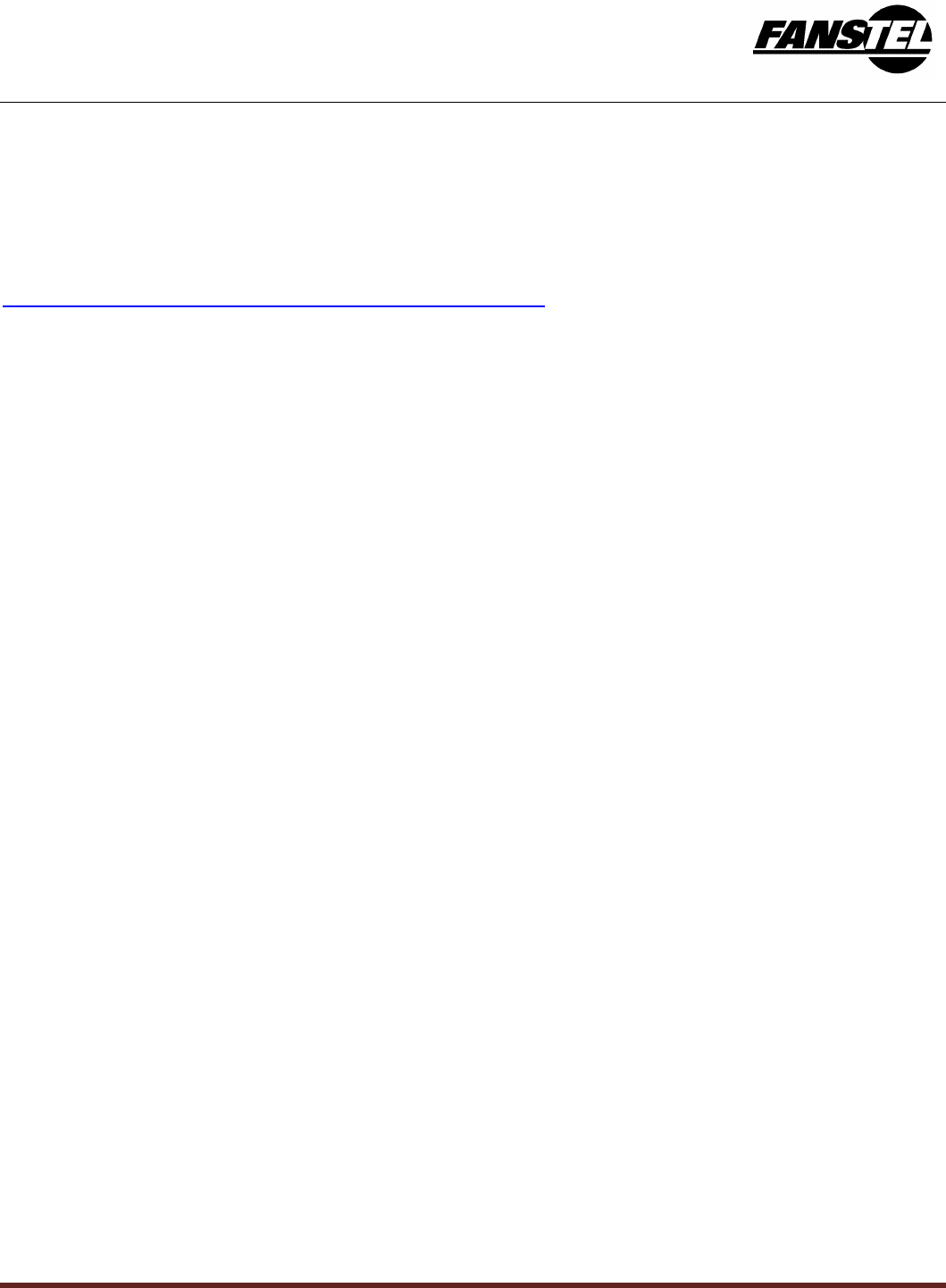
Bluetooth Low Energy(BLE) 4.2 Module BT832/BT832FVer 1.0 Nov. 2016
6
4. Product Overview
Brief description of nRF52832 SoC is provided. For full description of the SoC, please download from Nordic
Semiconductor website.
https://www.nordicsemi.com/eng/Products/Bluetooth-low-energy
Block Diagram
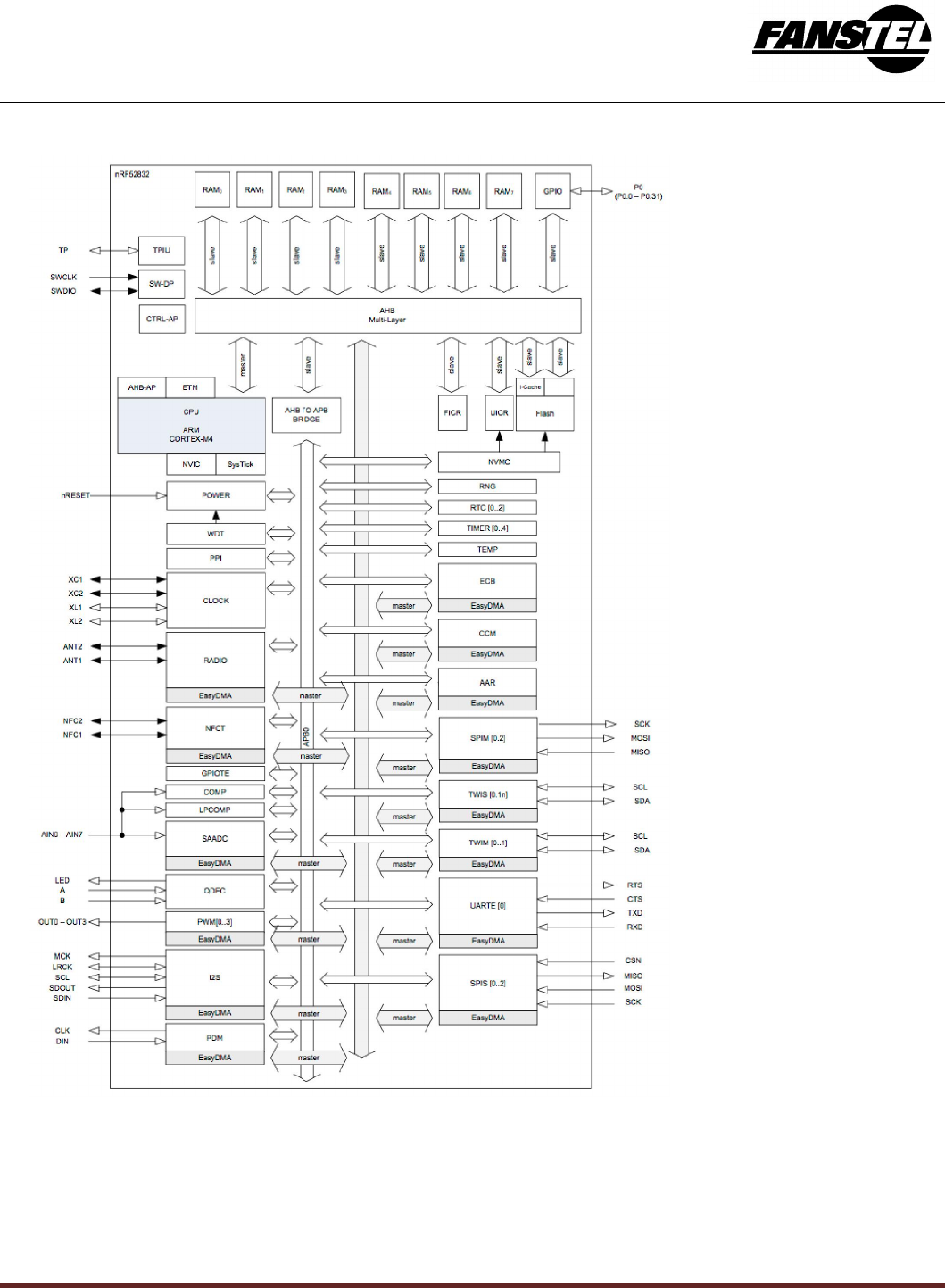
Bluetooth Low
Energy(BLE)
The following is a block diagram of
Nordic
The 32 bit ARM Cortex M4F MCU
with
code density and execution speed
are
Interconnect (PPI) system provides
Energy(BLE)
4.2 Module
BT832/BT832F
7
Nordic
nRF52832 Bluetooth Low Energy
(BLE)
with
hardware supports for DSP instructions
and
are
higher than other Cortex M MCU. The
Programmable
a 20-channel bus for direct and autonomou
s
BT832/BT832F
Ver 1.0 Nov. 2016
(BLE)
SoC.
and
floating point operations,
Programmable
Peripheral
s
system peripheral
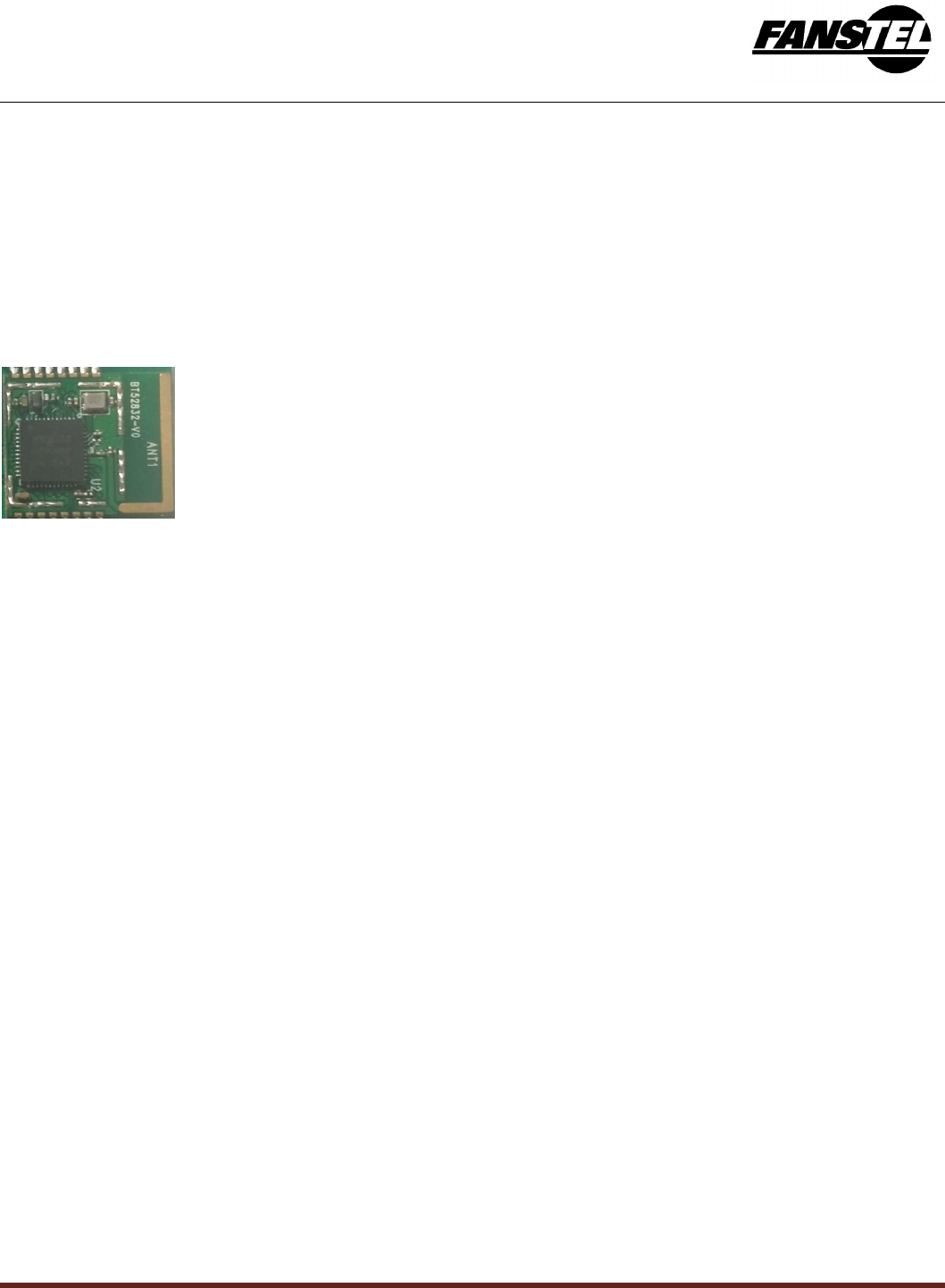
Bluetooth Low Energy(BLE) 4.2 Module BT832/BT832F
Ver 1.0 Nov. 2016
8
communication without CPU intervention. This brings predictable latency times for peripheral to peripheral
interaction and power saving benefits associated with leaving CPU idle. The device has 2 global power modes
ON/OFF, but all system blocks and peripherals have individual power management control which allows for an
automatic switching RUN/IDLE for system blocks based only on those required/not required to achieve
particular tasks.
The NFC block supports NFC-A tags with proximity detection and Wake-on-field from low power mode. The
NFC enables Out-Of-Band (OOB) Bluetooth pairing of devices and thus greatly simplifying deployment.
Photo
The following is a photo of BT832 module.
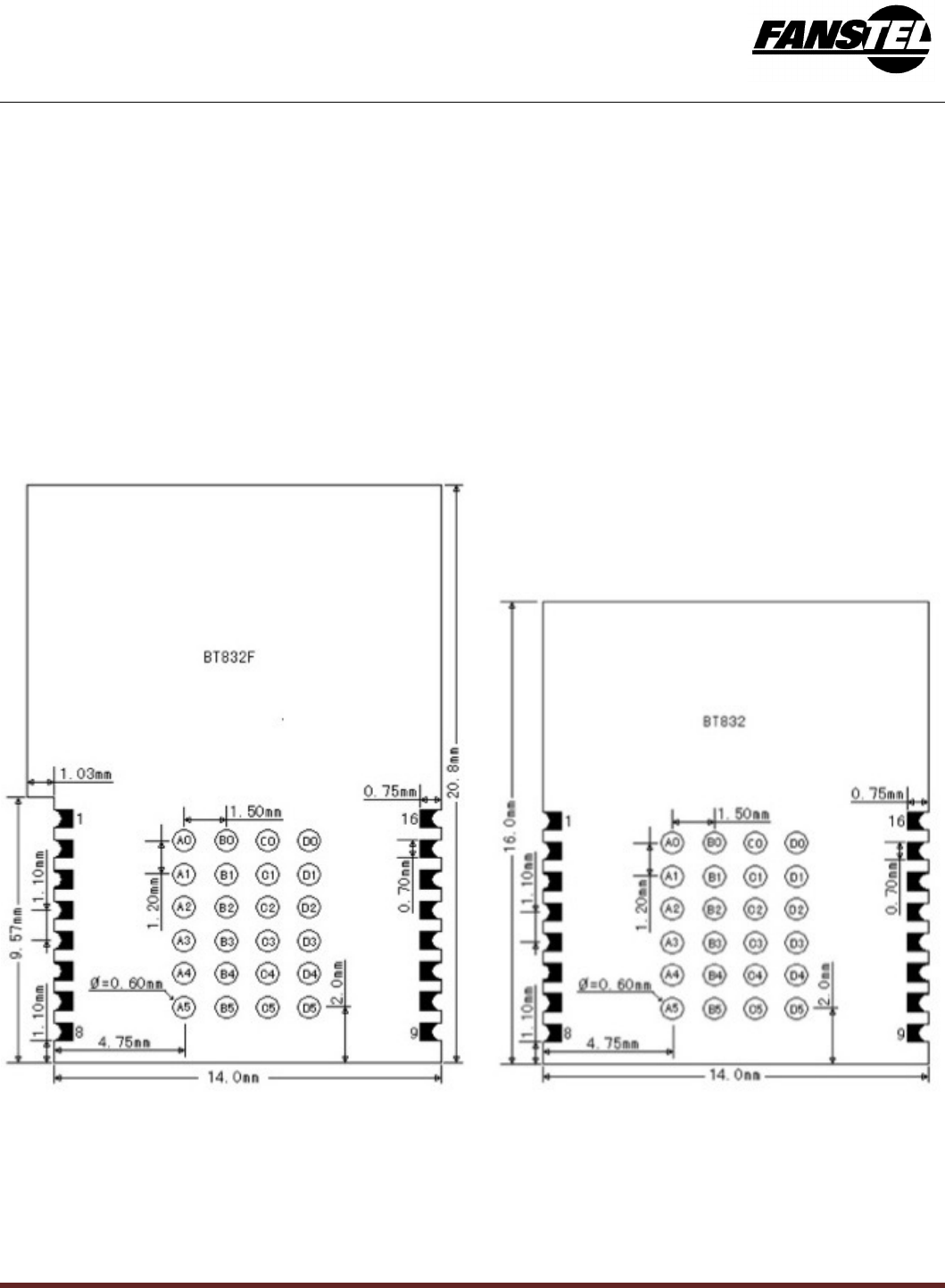
Bluetooth Low Energy(BLE) 4.2 Module BT832/BT832F
Ver 1.0 Nov. 2016
9
Mechanical Drawings
The followings are mechanical drawings of BT832 and BT832F. The bottom portion of module is the main body
(size: 14.0 x 9.57mm) with electronic components and pins for connection to the host board. The top portion of
module is for integrated PCB trace antenna. BT832 and BT832F have identical main body. BT832F has a
larger antenna area to accommodate a higher performance antenna.
We recommend layout the host PCB with clearance for the larger antenna area of BT832F. If the ultra long
Bluetooth line of sight range of BT832F is not required, the lower cost BT832 can be installed.
Two types of pins are available to meet different application requirements.
• 16 castellated pins for application needing limited number of IOs. SMT equipment is not required for
soldering castellated pins.
• 24 LGA (Land Grid Array) pins to access all 32 GPIOs of nRF52832 when needed.
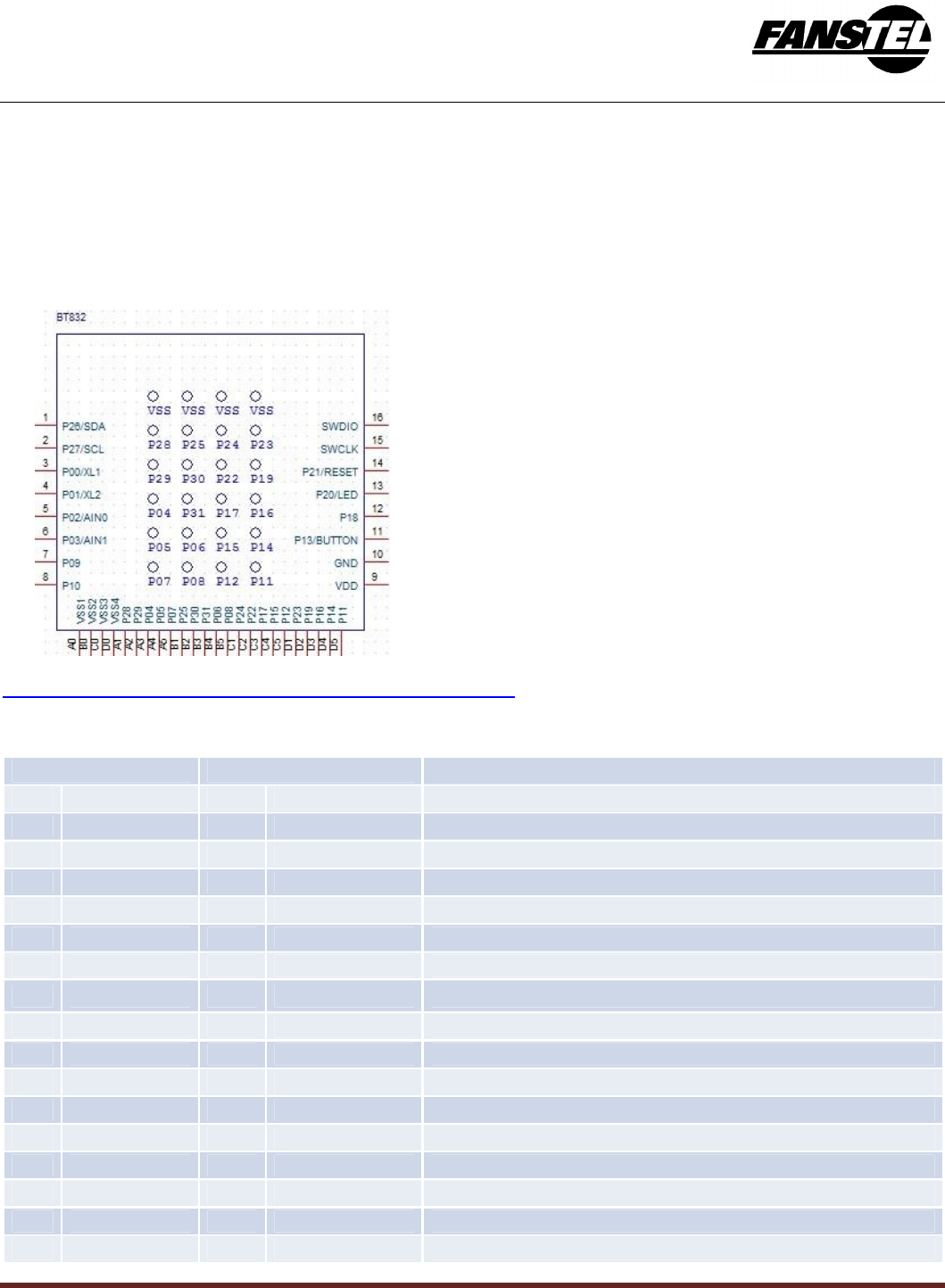
Bluetooth Low Energy(BLE) 4.2 Module BT832/BT832F
Ver 1.0 Nov. 2016
10
Pin Assignments of BT832
The followings are BT832 pin assignment. Pin functions are in a table in next section. Please refer to Nordic
nRF52832 Product Specifications for detailed descriptions and features supported.
http://infocenter.nordicsemi.com/pdf/nRF52832_PS_v1.1.pdf
BT832
nRF52832
pin#
pin name
pin#
pin name
Descriptions
1
P26/SDA
38
P0.26
GPIO, configured as I2C SDA on EV-BT832
2
P27/SCL
39
P0.27
GPIO, configured as I2C SCL on EV-BT832
3
P00/XL1
2
P0.00/XL1
GPIO, connection for 32.768kHz crystal
4
P01/XL2
3
P0.01/XL2
GPIO, connection for 32.768kHz crystal
5
P02/AIN0
4
P0.02/AIN0
GPIO, Analog input
6
P03/AIN1
5
P0.03/AIN1
GPIO, Analog input
7
P09
11
P0.09
GPIO
8
P10
12
P0.10
GPIO
9
VDD
13
VDD
DC supply 1.7V to 3.6V
10
GND
45
VSS
Ground
11
P13
16
P0.13
GPIO
12
P18
17
P0.14
GPIO
13
P20
23
P0.20
GPIO
14
P021/RESET
24
P0.21/RESET
GPIO, configurable as RESET pin
15
SWDCLK
25
SWDCLK
Serial Wire Debug clock input
16
SWDIO
26
SWDIO
Serial Wire Debug I/O
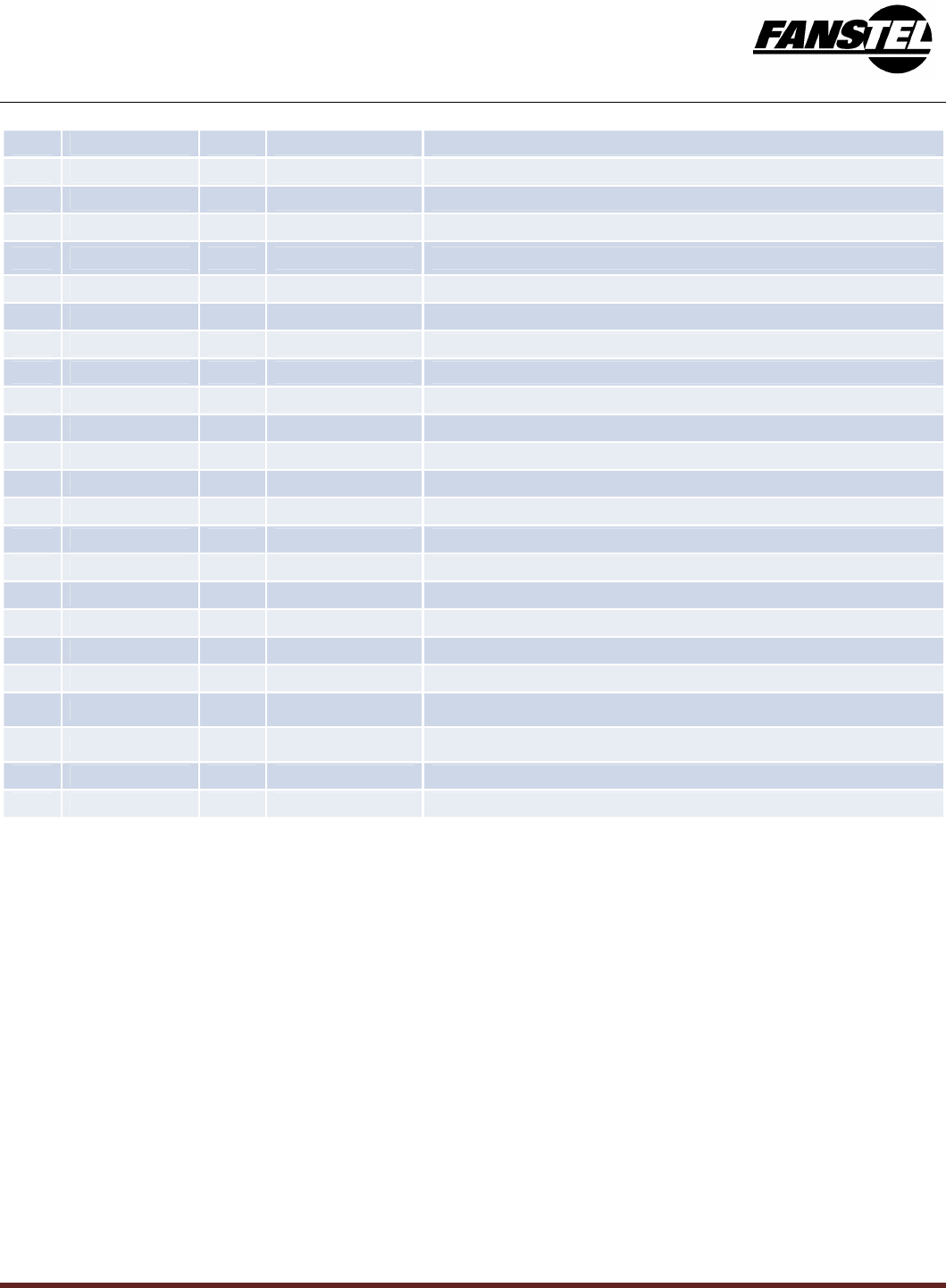
Bluetooth Low Energy(BLE) 4.2 Module BT832/BT832FVer 1.0 Nov. 2016
11
A0 GND 45
VSS Ground
A1 P28 40
P0.28/AIN4 GPIO, Analog input
A2 P29 41
P0.29/AIN5 GPIO, Analog input
A3 P04 6
P0.04/AIN2 GPIO, Analog input
A4 P05 7
P0.05/AIN3 GPIO, Analog input
A5 P07 9
P0.07 GPIO
B0 GND 45
VSS Ground
B1 P25 37
P0.25 GPIO
B2 P30 42
P0.30 GPIO
B3 P31 43
P0.31 GPIO
B4 P06 8
P0.06 GPIO
B5 P08 10
P0.08 GPIO
C0 GND 45
VSS Ground
C1 P24 29
P0.24 GPIO
C2 P22 27
P0.22 GPIO
C3 P17 20
P0.17 GPIO
C4 P15 18
P0.15 GPIO
C5 P12 15
P0.12 GPIO
D0 GND 45
VSS Ground
D1 P23 28
P0.23 GPIO
D2 P19 22
P0.19 GPIO
D3 P16 19
P0.16 GPIO
D4 P14 17
P0.14 GPIO
D5 P11 14
P0.11 GPIO
Pin Functions
Mounting BT832 on the Host PCB
The following figure shows recommended mounting of BT832 module on the host PCB.
• For the best Bluetooth range performance, the antenna area of module shall extend 6 mm outside the edge
of host PCB board, or 6 mm outside the edge of a ground plane.
• The next choice is to place module on a corner of host PCB, the antenna area shall extend 6mm from the
edge of ground plane. Ground plane shall be at least 5 mm from the edge of the antenna area of module.
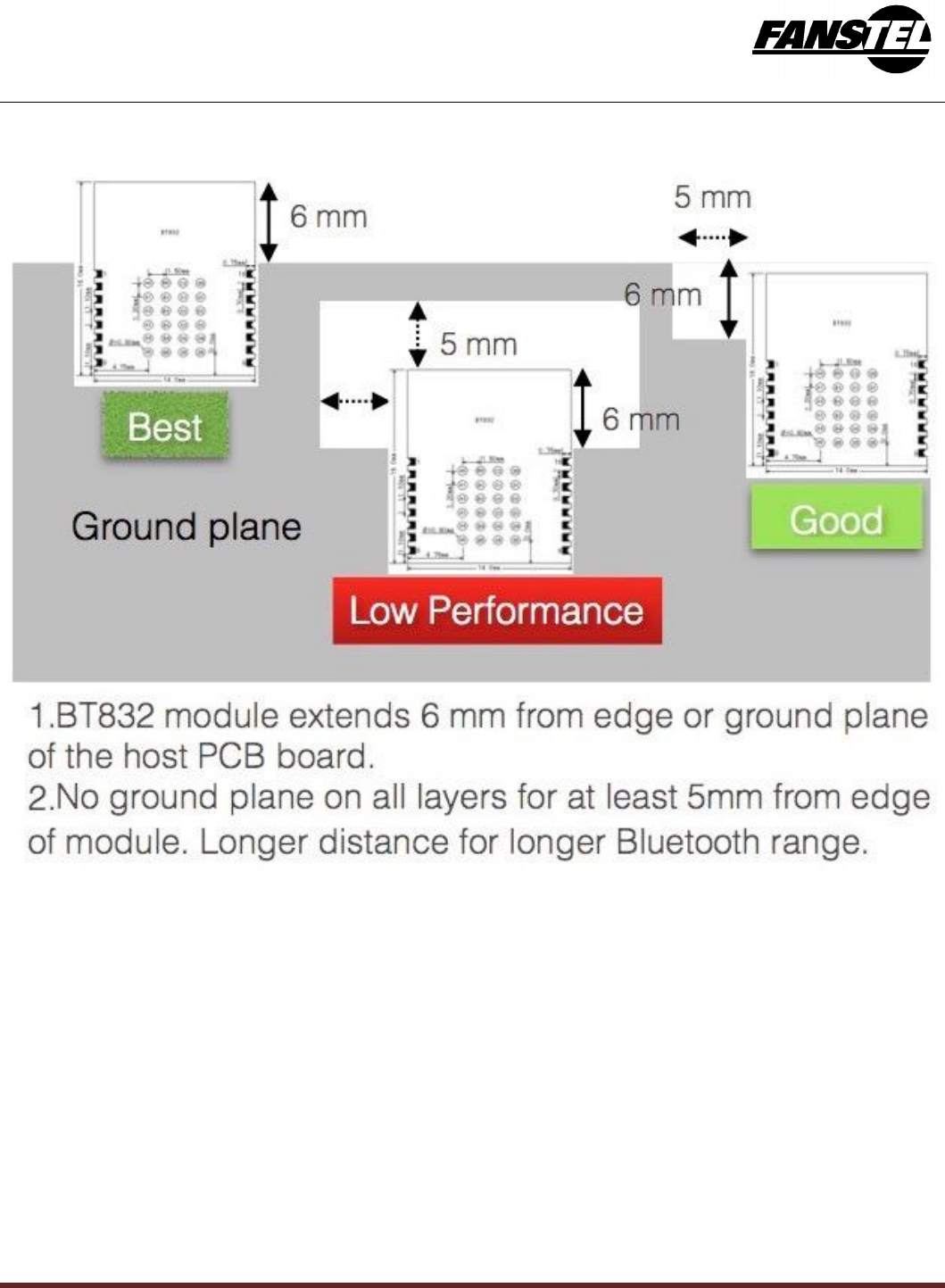
Bluetooth Low Energy(BLE) 4.2 Module BT832/BT832F
Ver 1.0 Nov. 2016
12
• Bluetooth range performance is degraded if a module is placed in the middle of the host PCB.
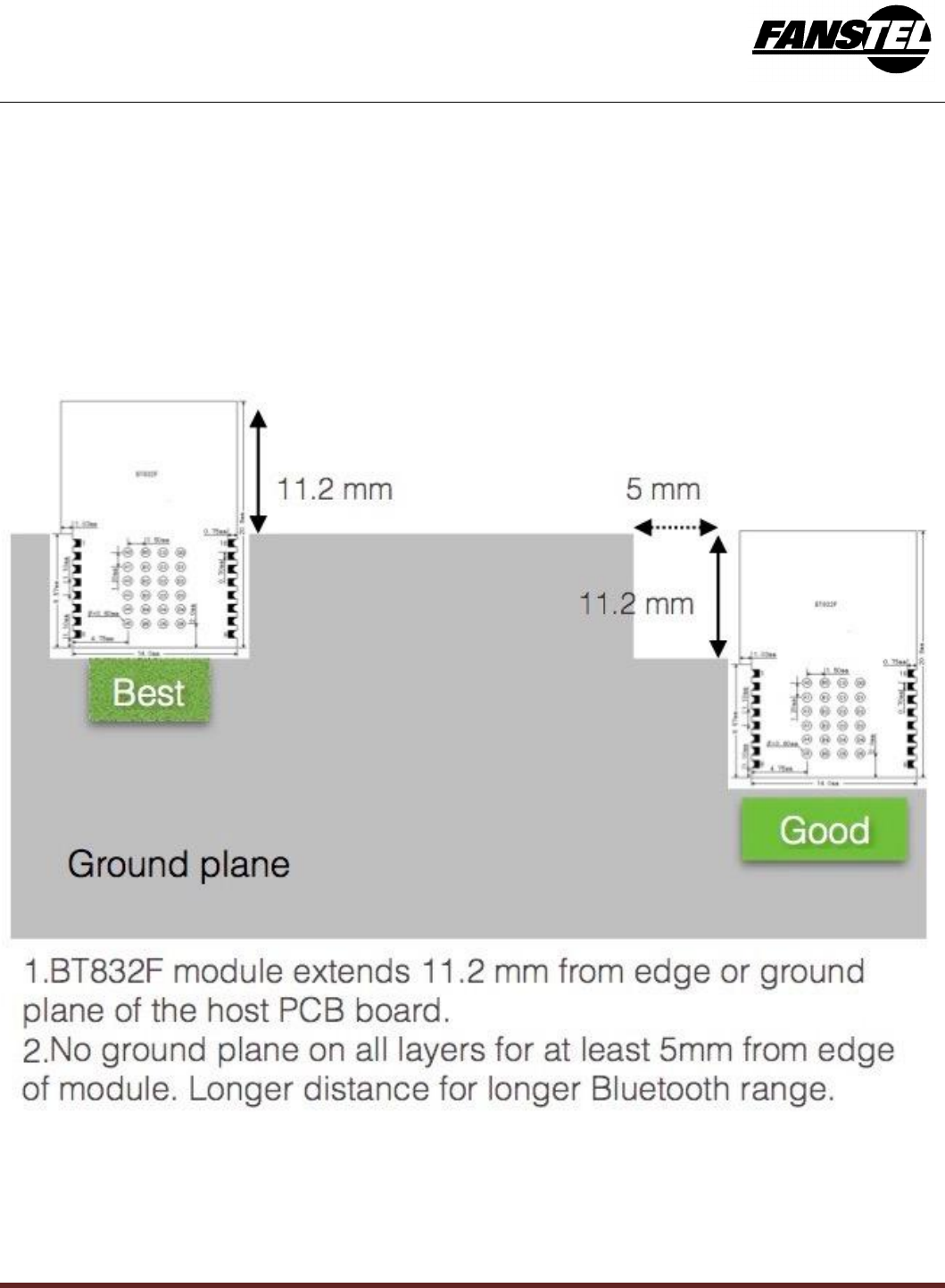
Bluetooth Low Energy(BLE) 4.2 Module BT832/BT832F
Ver 1.0 Nov. 2016
13
Mounting BT832F on the Host PCB
The following figure shows recommended mounting of BT832F module on the host PCB.
• For the best Bluetooth range performance, the antenna area of module shall extend 11.2 mm outside the
edge of host PCB board, or 11.2 mm outside the edge of a ground plane.
• The next choice is to place a module on a corner of host PCB, the antenna area shall extend 11.2 mm from
the edge of ground plane. Ground plane shall be at least 5 mm from the edge of the antenna area of
module.
• We don’t recommend mounting BT832F module in the middle of a host PCB.
For the best Bluetooth range performance, keep all external metal at least 30mm from the antenna area.
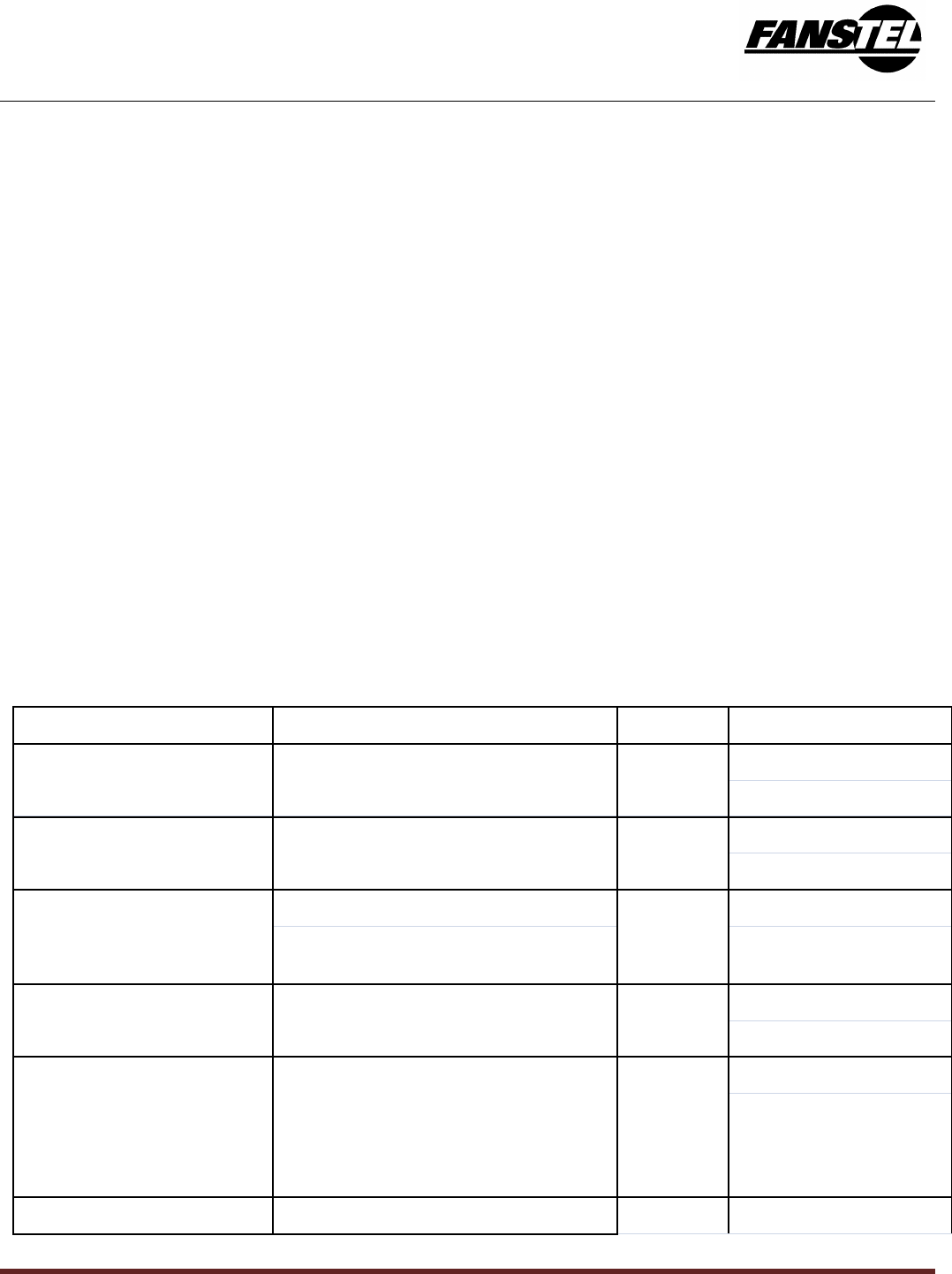
Bluetooth Low Energy(BLE) 4.2 Module BT832/BT832FVer 1.0 Nov. 2016
14
5. AT Commands
BT832 module is available with firmware supporting AT commands. Part number is BT832-AT.
Brief description of AT commands
Each command line consists of a prefix, a body and a terminator.
All command lines begin with the prefix AT (ASCII 065, 084) or at (ASCII 097, 116).
The body is a string of characters in the ASCII range 032-255. Control characters other than <CR>
(carriage return; ASCII 013) and <BS> (back space; ASCII 008) in a command line are ignored.
The terminator is <CR>.
There is no distinction between upper-case and lower-case characters. A command line can have a
maximum length of 80 characters. It is automatically discarded if the input is longer. Corrections are
made
AT command is case-insensitive, following /r/n for end code.
The default baud rate is 9600 one stop bit and no parity
Command mode
When P0.02of nRF52832 (pin 13 of BT832) is pulled high, it is set to AT command mode. In AT command
mode, the host processor communicates with the processor on BT832.
Command Response Parameter
example
AT OK or FAIL none AT/r/n
OK/r/n
AT+RESET OK or FAIL none AT+RESET/r/n
OK/r/n
AT+VERSION?
+VERSION:<param> Software
version
number
AT+VERSION?/r/n
OK +VERSION140804
OK/r/n
AT+NAME? +NAME:<param> OK Device
name
AT+NAME?/r/n
+NAME:EZPro OK/r/n
AT+NAME=<param> OK or FAIL Device
name
AT+NAME=Fanstel/r/n
Or
AT_Name=”Fanstel”/r/n
OK/r/n
AT+UART? +UART:<param>,<param2>,<param3> Baud rate, AT+UART?/r/n
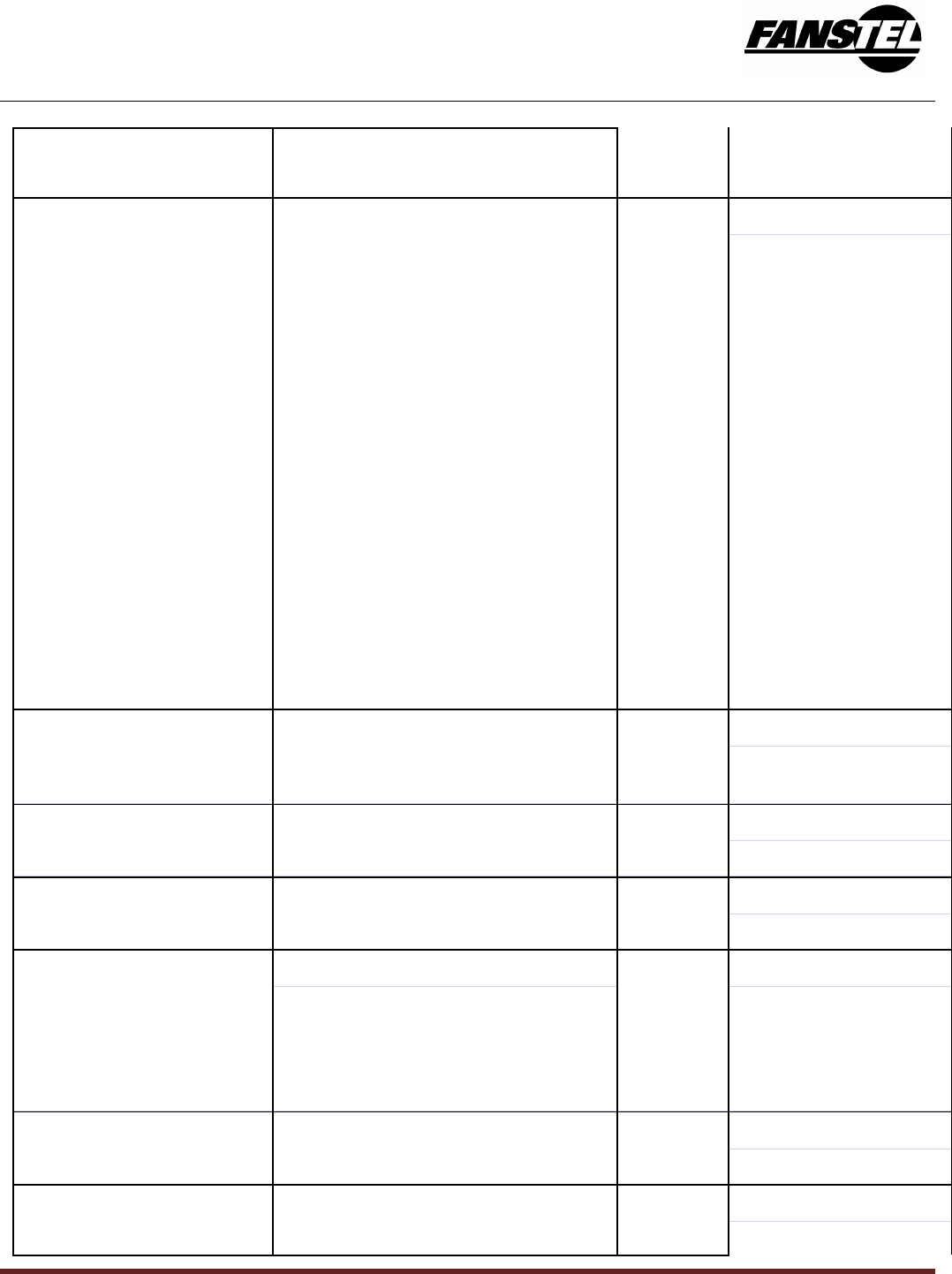
Bluetooth Low Energy(BLE) 4.2 Module BT832/BT832FVer 1.0 Nov. 2016
15
OK Stop bit, +UART:115200,1,0
Parity OK/r/n
AT+UART=<parm> +UART:<parm> Baud rate
AT+UART=115200/r/n
+UART:115200,1,0
OK/r/n
1200
2400
4800
9600 default
19200
38400
57600
115200
230400
460800
921600
1000000
AT+ADDR? +ADDR:<param> OK
Device
MAC
address
AT+ADDR?/r/n
+ADDR:abb5:cd:604ace
OK/r/n
AT+REGISTER OK or FAIL none AT+REGISTER/r/n
OK/r/n
AT+QUITREGISTER OK or FAIL none AT+QUITREGISTER/r/n
OK/r/n
AT+RX?
+Name:<parm>
none
AT+RX?/r/n
+UART:<parm> +NAME:EZPro/r/n
+ADDR:<parm> +UART:115200,1,1/r/n
+ADDR:abb5:cd:604ace
/r/n
AT+DEFAULT OK or FAIL none AT+DEFAULT/r/n
OK/r/n
AT_RFPW? +RFPW:parm +4~-8 AT+RFPW?/r/n
+RFPW:-4 OK/r/n
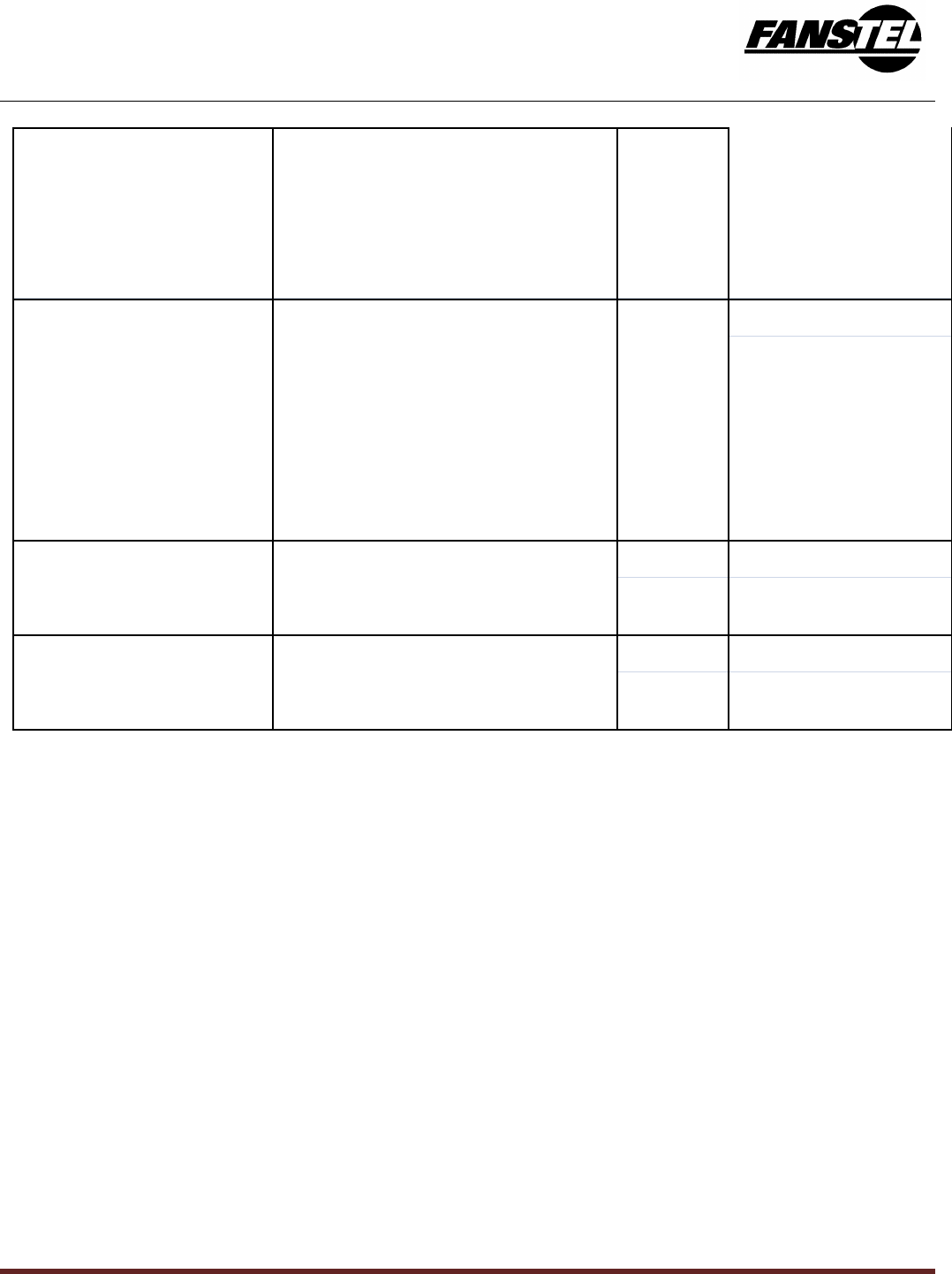
Bluetooth Low Energy(BLE) 4.2 Module BT832/BT832FVer 1.0 Nov. 2016
16
0:+4
1:+0 default
2:-4
3:-8
AT_RFPW=<parm> OK or FAIL +4~-8
AT+RFPW= 1/r/n
OK/r/n
0:+4
1:+0
2:-4
3:-8
AT+PIO=<param><param1>
OK or FAIL
P00-P05 AT+PIO=05, 0\r\n
1=High ,0=l
ow OK/r/n
AT+PIS=<param><param1>
OK or FAIL
P00-P05 AT+PIS=05, 1\r\n
1=output,
0=input OK/r/n
Data Mode
When P0.02 of nRF52832 (pin 13) of BT832 is pulled low, it is set to data mode. In data model, BT832
provides transparent data transfer between the host processor and a remote device, for example, a
smartphone.
6. BT832 Evaluation Board
Communicating with a PC
A quick and easy way to evaluate BT832 is to use a PC as the host processor. Connect the development
board EV-BT832 to a PC with an USB cable. Then,
SetS1, BT832 is set to command mode. PC will communicate with BT832.
Set switch S1 to the other position, BT832 is set to data mode. PC will communicate with a remote device through
BT832 Bluetooth wireless connection.
Docklight is a testing, analysis and simulation tool for serial communication protocols (RS232, RS485/422 and
others). It allows you to monitor the communication between two serial devices or to test the serial
communication of a single device. Docklight significantly increases productivity in a broad range of industries,
including automation and control, communications, automotive, equipment manufacturers, and embedded /
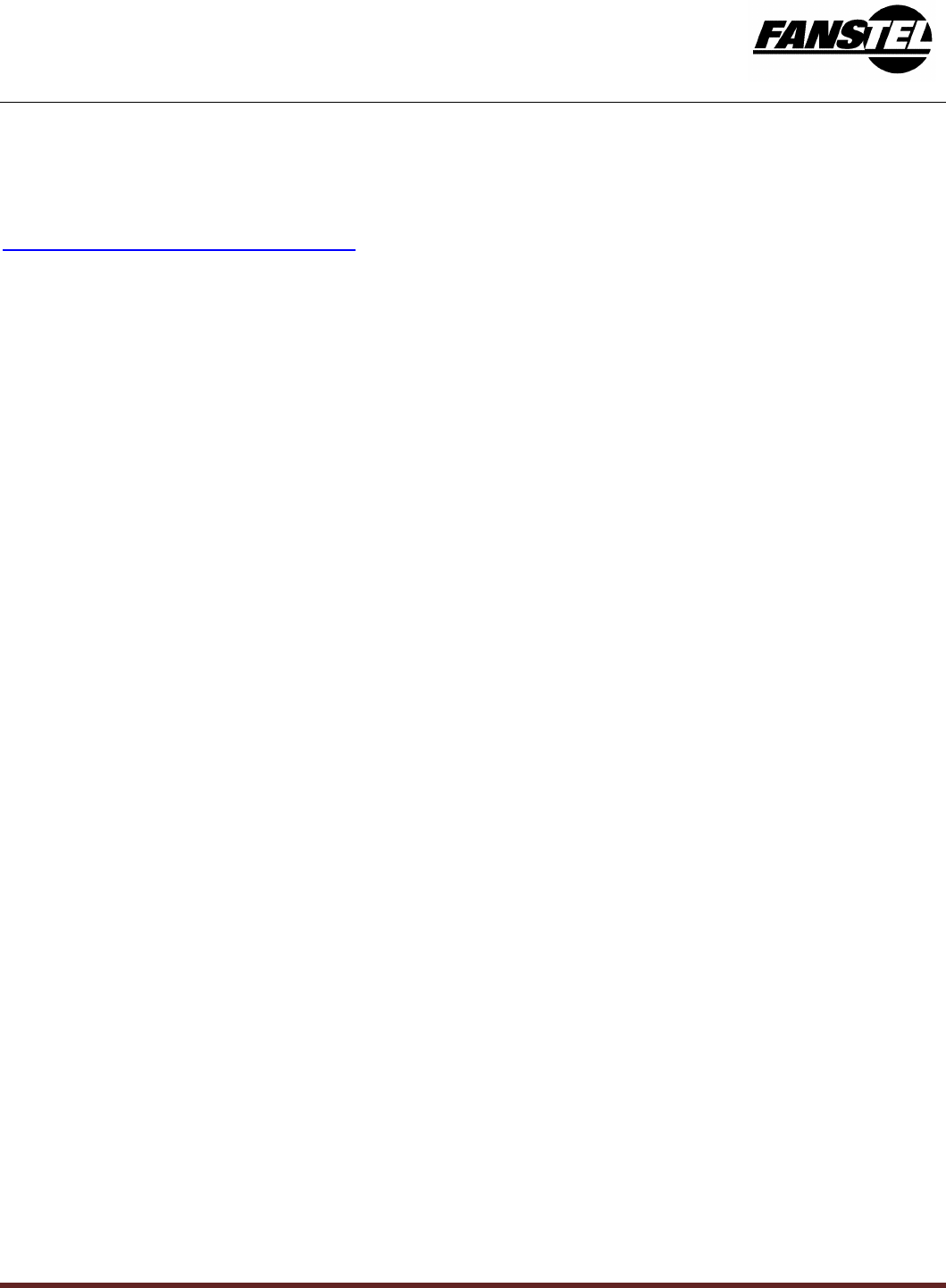
Bluetooth Low Energy(BLE) 4.2 Module BT832/BT832FVer 1.0 Nov. 2016
17
consumer products. Docklight is easy to use and runs on almost any standard PC using Windows 10, Windows
8, Windows 7, Windows Vista or Windows XP operating system.
Docklight software can be downloaded from the following:
http://www.docklight.de/download_en.htm
Suggestion for Battery Power Application
Standby current consumption is important for battery-powered product. We suggest adding a 32.768 kHz
crystal and 2 capacitors as shown in the upper left corner of the evaluation board schematics. The 32MHz
main clock won’t be active at idle state to save power.
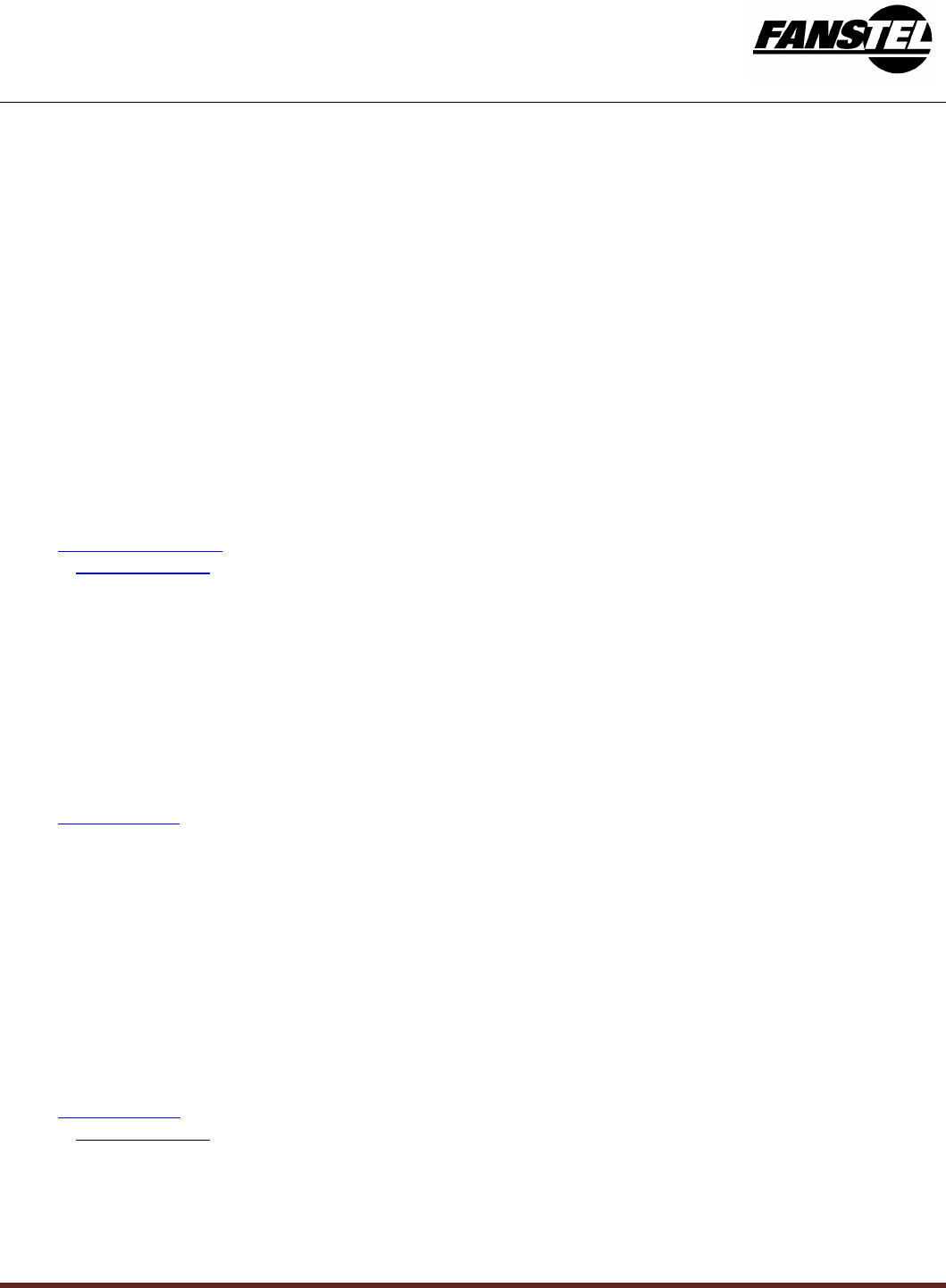
Bluetooth Low Energy(BLE) 4.2 Module BT832/BT832FVer 1.0 Nov. 2016
18
7. Miscellaneous
DON’T USE A MODULE WITH INTERNAL ANTENNA INSIDE A METAL CASE.
USE A MODULE WITH EXTERNAL ANTENNA INSIDE A METAL CASE. ANTENNA MUST BE OUTSIDE OF A
METAL CASE.
FOR PCB LAYOUT:
o AVOID RUNNING ANY SIGNAL LINE BELOW MODULE WHENEVER POSSIBLE,
o NO GROUND PLANE BELOW ANTENNA,
o IF POSSIBLE, CUT-OFF THE PORTION OF MAIN BOARD PCB BELOW ANTENNA.
CONNECT MODULE GROUND TO BATTERY GROUND.
8. Contact Us
United States:
Fanstel Corp.
7466 E. Monte Ctisto Ave. Scottsdale AZ 85260
Tel. 1 480-948-4928
Fax. 1-480-948-5459
Email: module@fanstel.com
Website: www.fanstel.com
Taiwan:
Fanstel Corp.
10F-10, 79 Xintai Wu Road
Xizhu, New Taipei City, Taiwan 22101
泛世公司
臺灣省新北市汐止區新臺五路 79 號10 樓之 10, 22101
Tel. 886-2-2698-9328
Fax. 886-2-2698-4813
Email: tp@fanstel.com
Website: www.fanstel.com
China:
Fanstel Technologies Corp.
11 Jiale Street
Ping-Dih, Long-Gang, Shen Zhen, GD 518117
泛世康科技(深圳)有限公司
廣東省深圳市龍崗區坪地鎮佳樂街 11 號
Tel. 86-755-8409-0928
Fax. 86-755-8409-0973
QQ. 3076221086
Email: sz@fanstel.com
Website: www.fanstel.com
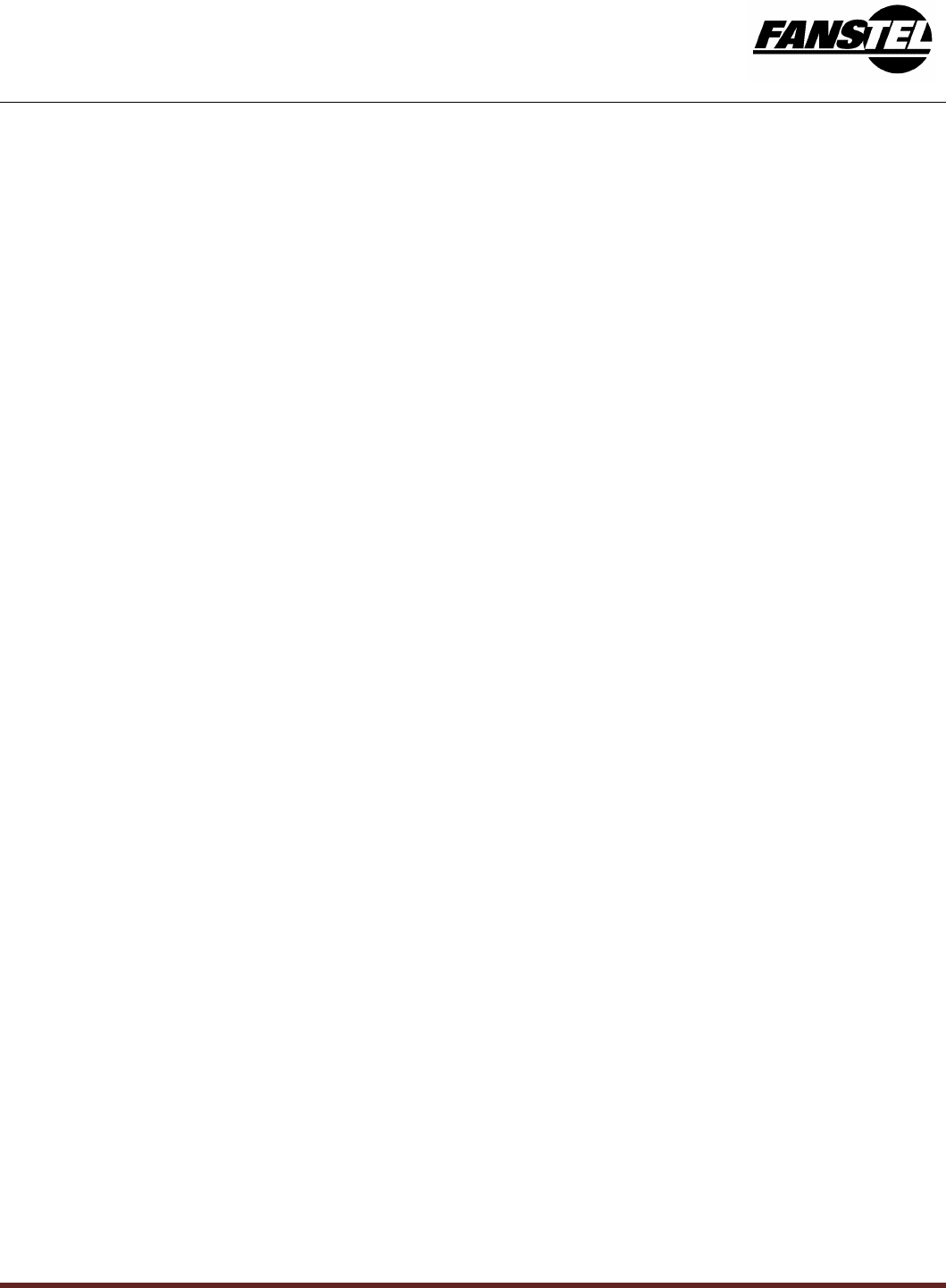
Bluetooth Low Energy(BLE) 4.2 Module BT832/BT832FVer 1.0 Nov. 2016
19
Federal Communications Commission (FCC) Statement
15.21
You are cautioned that changes or modifications not expressly approved by the part responsible for compliance
could void the user’s authority to operate the equipment.
15.105(b)
This equipment has been tested and found to comply with the limits for a Class B digital device, pursuant to part
15 of the FCC rules. These limits are designed to provide reasonable protection against harmful interference in a
residential installation. This equipment generates, uses and can radiate radio frequency energy and, if not
installed and used in accordance with the instructions, may cause harmful interference to radio communications.
However, there is no guarantee that interference will not occur in a particular installation. If this equipment does
cause harmful interference to radio or television reception, which can be determined by turning the equipment
off and on, the user is encouraged to try to correct the interference by one or more of the following measures:
-Reorient or relocate the receiving antenna.
-Increase the separation between the equipment and receiver.
-Connect the equipment into an outlet on a circuit different from that to which the receiver is connected.
-Consult the dealer or an experienced radio/TV technician for help.
This device complies with Part 15 of the FCC Rules. Operation is subject to the following two conditions:
1) this device may not cause harmful interference, and
2) this device must accept any interference received, including interference that may cause undesired operation
of the device.
FCC RF Radiation Exposure Statement
1) This Transmitter must not be co-located or operating in conjunction with any other antenna or transmitter.
2) This equipment complies with FCC RF radiation exposure limits set forth for an uncontrolled environment.
This equipment should be installed.
Note: The end product shall has the words “Contains Transmitter Module FCC ID: X8WBT832
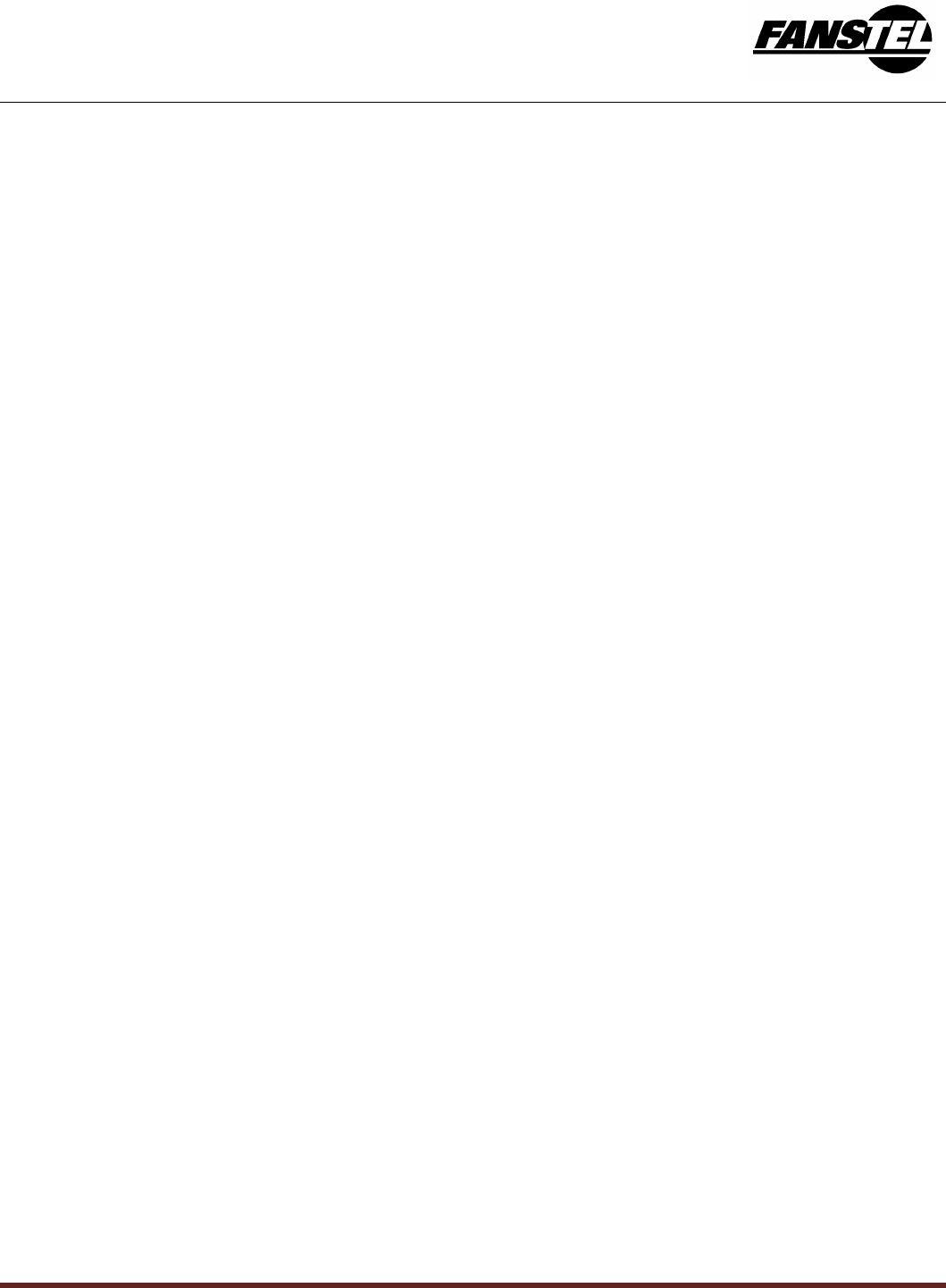
Bluetooth Low Energy(BLE) 4.2 Module BT832/BT832FVer 1.0 Nov. 2016
20
Canada, Industry Canada (IC)
Cet appareil numérique de classe B est conforme à la norme NMB-003.
This device complies with Industry Canada licence-exempt RSS standard(s). Operation is subject
to the following two conditions: (1) this device may not cause interference, and (2) this device
must accept any interference, including interference that may cause undesired operation of the
Le present appareil est conforme aux CNR d'Industrie Canada applicables auxappareils radio exempts de licence.L'exploitation est
autorisée aux deux conditions suivantes:
(1) l'appareil ne doit pas produire de brouillage, et
(2) l'utilisateur de l'appareil doit accepter tout brouillage adioélectrique subi, même si le brouillage est susceptible d'en compromettre
le fonctionnement.
Canada, avis d'Industry Canada (IC)
“Le présent appareil est conforme aux CNR d'Industrie Canada applicables aux appareils radio exempts de
licence. L'exploitation est autorisée aux deux conditions suivantes : (1) l'appareil ne doit pas produire de
brouillage, et (2) l'utilisateur de l'appareil doit accepter tout brouillage radioélectrique subi, même si le
brouillage est susceptible d'en compromettre le fonctionnement."
(Modular approval) End Product Labeling:
The final end product must be labeled in a visible area with the following: “Contains IC: 4100A-BT832”.
Caution: Exposure to Radio Frequency Radiation.
To comply with RSS 102 RF exposure compliance requirements
OEM statement
The Original Equipment Manufacturer (OEM) must ensure that the OEM modular transmitter must be labeled with its own FCC ID
number. This includes a clearly visible label on the outside of the final product enclosure that displays the contents shown below. If
the FCC ID is not visible when the equipment is installed inside another device, then the outside of the device into which the
equipment is installed must also display a label referring to the enclosed equipment
The end product with this module may subject to perform FCC part 15 unintentional emission test requirement and be properly
authorized.
This device is intended for OEM integrator only.